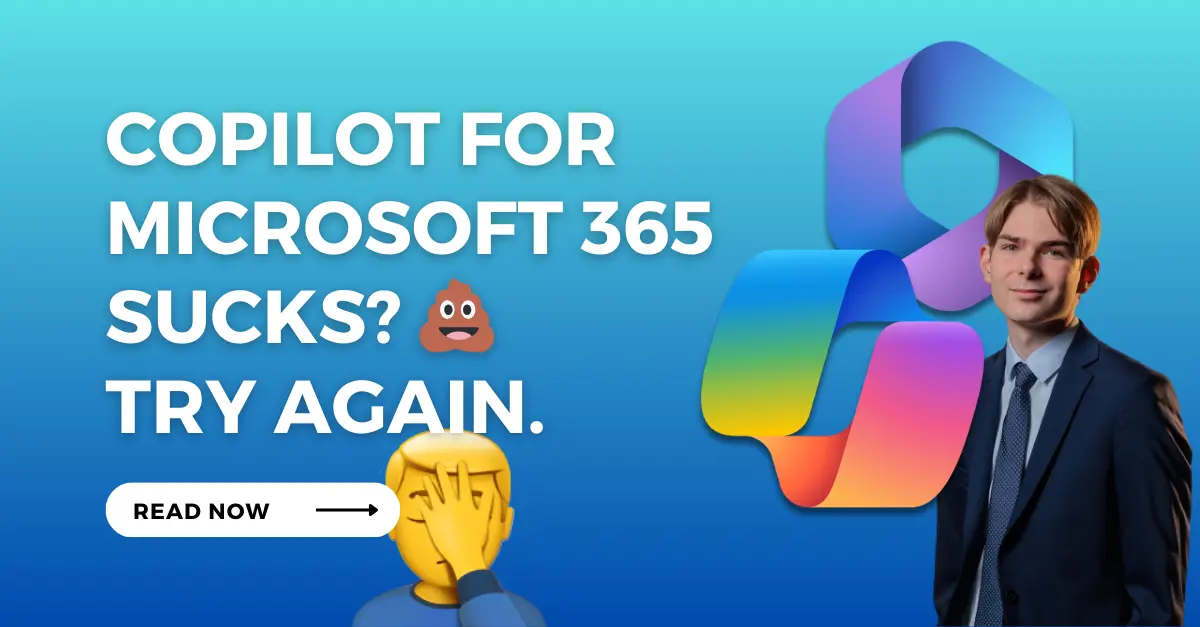Disappointed in Copilot for M365? Try again with these tips💡
Does Copilot for Microsoft 365 SUCK? Or are you just not using it properly? Try again with these tips!

Copilot for Microsoft 365 has been widely available for just over a month now, and many have enthusiastically jumped on the AI bandwagon. I have been using Copilot since October 2023, and have worked in many projects helping customers adopt Copilot features. However, now that the hype cloud has settled a bit, many statements – both in Finland and abroad – have stated that Copilot for M365 would be a huge disappointment and would not really bring any value to users.

These opinions have caused some frustration for me – I have personally trained hundreds of information workers to use Copilot, and I believe they have benefited greatly from the tool. However, getting these benefits requires some practice with the tool and knowledge of certain things. So, dust off your Copilot keys and start experimenting with AI again with the following tips:
Learn the quirks and limitations 🧟
Copilot for Microsoft 365 is nothing earth-shattering in the end. It's just a set of new features for the apps we already use. As with all features, it's important to be aware of their characteristics, such as what's possible and what's not. If these are not acknowledged and understood, the experience can of course be poor. It's like trying to do bookkeeping or financial reporting with an email app!
Copilot for each application is a completely separate app, so you have to learn each of them separately. If PowerPoint can do thing X based on your prompt, that same prompt might not work in Word. At the moment, Copilots are also quite independent, unless the interaction with different applications has been separately defined by the developers – the applications (and their Copilots) do not talk to each other.
Some examples of the limitations you have to learn:
- Word can create content only from PowerPoint- or Word-files
- You can only reference a maximum of 3 files in a prompt with Word
- PowerPoint can create presentations from only Word-files
- Only Copilot Chat (previously M365 Chat) can process PDFs
Unfortunately, these limitations and other small quirks are not so much listed on Microsoft Learn, but must be learned by yourself or taught by some reliable source. If Copilot can't do something – it might be that you just asked for it in the wrong place!
Don't believe in marketing, focus on what's possible 🏅
I have to admit that Copilot for M365 is not quite what the marketing material had us expecting. But think about the last time you took a photo with your phone that's as good as in the manufacturer's ads? Therefore, the smartest thing you can do is completely forget about those promotional videos from Microsoft. The materials contain many examples and features that are still on the roadmap and not yet in use.
Although I just talked about quirks and learning about limitations in the previous point, it's important that you approach Copilot through its possibilities, not limitations. Yes, not everything we hope for is possible yet, but there are already many things that increase productivity. For example, Copilot in Teams can create meeting recaps and notes that are actually really good, even if the meeting was held in Finnish. I save a lot of time weekly just with that feature.
Prompt Engineering is the most important skill you can learn🧑🏻💻
The other side of a tool controlled with natural language is that the AI is only as good as the prompts you feed it. Especially at first, it may seem difficult to understand that there are no right or wrong commands with Copilot, because natural language gives the user so many options to do things. So you'll definitely have to spend some time practicing how Copilots in different apps handle prompts, using trial and error to go through all of it. My colleague perhaps said it best: "Remember, Copilot can't read your mind. Don't assume it knows what you want, you have to tell it."
If you feel like you're bad at prompting – DON'T WORRY! No one is expecting you to be an expert already without practice. Now is a good time to take a moment to practice and get better. That is why all of our Copilot services now include a separate prompt engineering training, where you learn to build better prompts step by step.
You are at the forefront of development – act accordingly 🌊
It must be admitted that Copilot does not solve all the problems of information workers. The important thing to remember is that Copilot will never be the answer to everything. At the same time, it should be remembered that the tool is only taking its first steps, before January being only available to a fairly limited number of people.
However, I have to say that I am very confident about the future. I have been using Copilot for just over 4 months now, and I can already say that the development has been crazy. The biggest factor is especially the speed of development and iteration. In the past, we got used to waiting for new features and updates for months, sometimes up to a year. With Copilot, new features appear weekly, and almost every time you use it, you discover and learn something new.
This requires a different attitude from the user towards the features and the tool as a whole. Rarely has there been a situation where something that did not work last week is now possible. Also, these changes are not always documented, so Copilot rewards the users who dare to try again and again. It's also important to remember the following guideline with Copilot: Just because something didn't work doesn't mean you necessarily failed.
Stay curious, and remember that change always requires learning. The advent of artificial intelligence will inevitably change information work, and it is not worth jumping off the train because of the first disappointments. If we look back, the story and development of the Internet did not end with the burst of the .com bubble, nor does the journey of artificial intelligence end with the first challenges. Without practice, everything may seem disappointing at first, but those who have the energy to learn are the ones who will win in the end.

